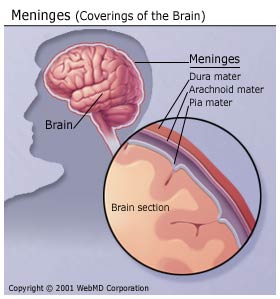Recognition and signs of Meningitis
Meningitis refers to the inflammation of the membranes (also called meninges) that surround the brain and spinal cord. Meningitis can be caused by a viral, bacterial or rarely a fungal infection. 
Whether meningitis is mild or life-threatening depends on the cause of the infection. If you suspect that you or someone you know may have meningitis, seeking immediate medical help is critical.
Complications of meningitis
Seeking early treatment can prevent complications such as:
- Poor memory
- Hearing loss
- Learning disabilities
- Problems with gait
- Brain damage
- Seizures
- Shock
- Kidney failure
Signs and symptoms of meningitis
Note that certain forms of meningitis can be contagious and the germs causing it can pass from one individual to another when the infected person sneezes or coughs.
Common signs and symptoms of meningitis among young adults and teenagers include:
- Fever
- Stiff and painful neck
- Vomiting
- Headache
- Seizures
- Drowsiness
People with other medical conditions and children and adults may have different symptoms such as:
- Babies may refuse to eat. They may be irritable and may cry when they are held. They may have a rash too.
- Young children may cough, have trouble breathing or may act like they have a flu
- People with other medical conditions and older adults may have a fever or a slight headache
Seek emergency medical advice immediately if you suspect a child has meningitis. Bacterial meningitis is a life-threatening problem which needs to be treated promptly.
Risk factors for meningitis
You may be at risk of meningitis if:
- Vaccinations are missed. Many common forms of meningitis are covered by vaccination.
- Viral meningitis is common in young children of ages under 5 and bacterial meningitis typically occurs in individuals under 20, especially if they’re living in a community setting
- Living in a community setting. Meningitis is contagious so students living in dorms, kids’ boarding schools, people in military bases, children in child care facilities etc., are especially at risk of meningitis
- Suppressed immune system. Factors such as diabetes, alcoholism, AIDS, and usage of immunosuppressant drugs may increase risk. Removal of the spleen may increase your risk too as it is an important aspect of the immune system
Want to learn more about first aid? Why not sign up to one of our free online first aid courses!





